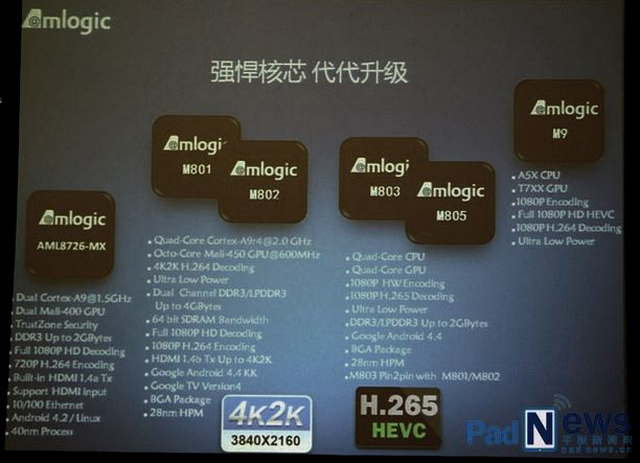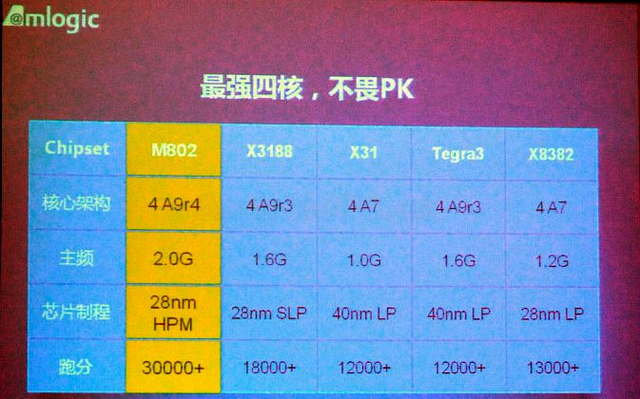We already knew AMLogic is about to release a quad core Cortex A9 SoC, previously codenamed AML8726-M8, but recently renamed to M80X family with 4 different SoCs, but the company has now officially announced the new M8 family, as well as M9 that will feature 64-bit ARM Cortex A5X cores with Mali T7XX GPU. Onda V975m, the first tablet based on M802 processor, was also part of the announcement. Price: 999 CNY (~$164).

The new products line is divided as follows:
- M801/M802
- Quad core Cortex A9r4 @ 2GHz with Octo-core Mali-450MP GPU @ 600MHz
- 4K2K video decoding, Full 1080p decoding (multi-codec), and 1080p H.264 encoding
- Dual channel DDR3/LPDDR3 up to 4GB
- 64-bit SDRAM bandwidth
- HDMI 1.4 up to 4K2K
- OS – Android 4.4 Kit Kat (Dec. 2013), Google TV version 4
- BGA package, 28nm HPM
- M803/M805
- Quad core CPU with Quad core GPU
- 1080p H.265 decoding, and 1080p HW encoding
- Dual channel DDR3/LPDDR3 up to 2GB
- 64-bit SDRAM bandwidth
- OS – Android 4.4 Kit Kat
- BGA package, 28nm HPM. M803 pin-to-pin compatible with M801/M802
- M9:
- ARM Cortex A5X CPU (64-bit ARMv8), Mali T7XX GPU
- 1080p encoding, 1080 H.265 / H.264 decoding
- Ultra low power
Details about M9 are very sparse for now, and the company focused the event on their M8 family, and especially M802 which is the most powerful SoC of the family, whereas M803/M805 are lower end SoCs.
M802 quad core processor was compared to Rockchip RK3188, AllWinner A31, Nvidia Tegra 3 and Mediatek MT8382. The most interesting part was that M80X processor use a new version of Cortex A9 core (A9r4) that allows for higher clock speed, and lower power consumption compare to the A9r3 used in Rockchip RK3188.

As shown above, M802 vastly outperform RK3188 in Antutu thanks to the A9r4 cores with higher frequency, and Mali-450MP6 GPU (132 MT/s, 3,600 Mpixel/s, 54 GFLOPS) that even outperforms PowerVR SGX544MP2 (110 MT/s, 3,000 Mpixel/s, 22.4 GFLOPS). They’ve also shown a slide showing V975m tablet (9.7″, M802) with equivalent and in some cases even lower power consumption than another 9.7″ tablet powered by a quad core Cortex A7 processor.
Beside V975m, another long expected product, Geniatech ATV1800, should become available at the end of the month with M801 (or M802). Many players currently support 4K2K video decoding with 1080p HDMI video output, but AFAIK, the new Geniatech media player will be one of the first (relatively low cost) STB to support 4K2K decoding and 4K2K HDMI output.
Via AndroidPC.es and Padnews.cn (more slides there)

Jean-Luc started CNX Software in 2010 as a part-time endeavor, before quitting his job as a software engineering manager, and starting to write daily news, and reviews full time later in 2011.
Support CNX Software! Donate via cryptocurrencies, become a Patron on Patreon, or purchase goods on Amazon or Aliexpress. We also use affiliate links in articles to earn commissions if you make a purchase after clicking on those links.





They are claiming HW decoding of 1080p resolution, which is a lie because as far as I know Mali GPU does not released drivers. So is all done in SW and by the CPU.
Still no SATA…
BTW the price will be higher than Rk3188, at what price Intel x86 system are starting to be more attractive because of HW acceleration.
@Passante
In ARM SoC, the GPU (almost?) never support hardware video decoding, only 3D and 2D graphics, the VPU (video processing unit) does it. All recent application processors for tablet/smartphones support 720p or 1080p hardware decoding, at least in Android where binary drivers are provided (but no source code), but only a few support Linux.
Thaks for the clarification, but this also means no XBMC 1080p playback 🙁
@Passante
Why not? XBMC as run in Android does makes use of the VPU so there shouldn’t be an issue in the M8.
Passante there is an entire branch of XBMC dedicated to Amlogic so yeah they are going to be supported, Pivos works with Amlogic.
Amlogic builds of XBMC are separate from the general XBMC offered on the website, you only get Amlogic XBMC from the vendor or by compiling it yourself.
Also notice in the image for the M801/802 it mentions GoogleTV v4 support! (aka AndroidTV) that is very good news, no more half assed android boxes but proper ones designed for TV usage. Oh and 4K support too which will make some happy.
If Amlogic now support AndroidTV then it could mean they support mediacodec (Android video decoding API in 4.2+) which would mean generic XBMC would also work with it but the Amlogic builds may still offer performance enhancements.
Does M803 and M805 SoCs support HVEC (H.265) hardware decoding on VPU or only software decoding on GPU?
If on VPU then are M803 and M805 the first ARM SoCs to officially support HVEC (H.265) hardware decoding?
@Rocker
It was a typo (H.256), it’s only H.264. Only M9 will get HEVC.
Pivos Group have let the cat out of the bag and already said in their forums that the new media player box(es?) that should be replacing Pivos Xios DS Player will also be Amlogic based, so guess we soon will be seeing a Pivos box with Amlogic M8 SoC, or M9 you think?
http://www.pivosforums.com/viewtopic.php?f=12&t=3714
Rumor was that Pivos will release both a Dual-Core CPU / 1GB RAM stick and a Quad-Core CPU / 2GB RAM box, both with Android only support, with no Official Linux image supports or builds from Pivos themselves.
But since that roadmap only lists Quad-Core CPU SoCs I guess that if Pivos release a box and a stick then both will havw quad-core CPU, though they could still use different M8 models
or maybe the box will be M9 based and the stick M8 based?
@cnxsoft Ok but i see that Amlogic did the same typo on their roadmap image too, so are you sure about that for all M8 models?
Even so, the question will then instead be the same for M9 SoC:
Does the M9 SoCs support HVEC (H.265) hardware decoding on VPU or only software decoding on CPU?
If on VPU then are M9 the first ARM SoC to officially support HVEC (H.265) VPU hardware decoding?
@Rocker
Sorry I got all mixed up, and looks at M801/M802. M803/M805 appear to support HEVC, but it’s not entirely sure how this will work. They separate 1080p HW decoding, and 1080p H.265 decoding. But I doubt an SoC without a GPU supporting OpenCL could handle 1080p HEVC by software, so I’d assume it’s hardware decode.
Most probably M9 will support HW decode.
Snapdragon 805 has been announced with HEVC 4K2K hardware support a couple of weeks ago.
http://www.cnx-software.com/2013/11/21/qualcomm-unveils-snapdragon-805-processor-with-full-4k-support/
@Jako
Dual core SoC: AML8726-MX.
Quadcore SoC: One of M8 SoCs
For M9, you’ll need to wait for a while, maybe Q4 2014? Moreover, I don’t think Android is fully ported to support ARMv8 at this point.
http://www.enybox.com/news/pics/20131223/201312241387860829813.jpg
Is it a development board ?
@PanJaBu
It does not look like a development board, more like a board you’d put in a media player.
@cnxsoft
Thanks for the your reply.
Allwinner release The A80 Optimus Board.
hey guys, why getting so excited?
1.) HEVC is software, not hardware decoder, and up to 720p only… er
2.) LAN PHY is still 100M, for a new chip releasing on 2014, I fairly expected 1000M
3.) No USB 3.0, again, come on, it’s 2014!
4.) HDMI 1.4b, not HDMI 2.0, faked 4K support <– up to 30fps only
It's a BIG DISAPPOINTMENT! There is nothing really new and useful at all??
I would rather wait for a new chip with:
HEVC 1080p decoder, Gigabit PHY, USB 3.0 and HDMI 2.0 with 4K @ 60fps (new phones take video at 60fps not 30fps…)
@Hybrid_S
Totally agree – hardware decoding, USB3 and real GigE networking should be more commonplace on these devices.
Geebuying has some picture and benchmark for Onda v975m. Antutu 4 score: 30174 with Android 4.3, Nenamark 2 @ 60fps.
http://blog.geekbuying.com/index.php/2014/01/08/android-4-3-os-onda-v975m-amlogic-m802-quad-core-tablet-unboxing-review/#.Us1X5_gdepk